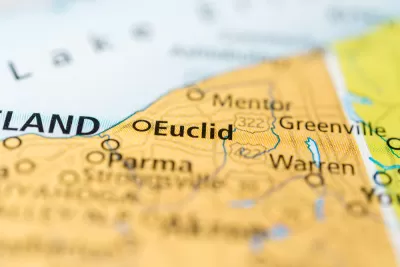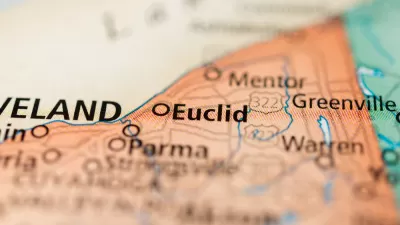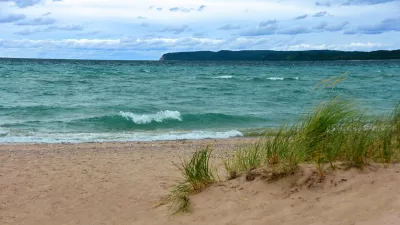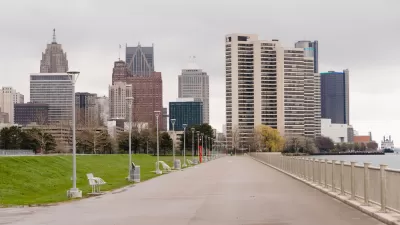Clear communication and a fair trade let Euclid, Ohio begin to rethink its lakefront—and its future.

Euclid, Ohio is not the first town built by Industrial Age magnates that undervalued a lake used more often for dumping trash than for recreation. And it is not the first town to reimagine that waterfront as an asset for current residents and a draw for new ones.
But like much of the waterfront on the Great Lakes, the properties that line the shore in Euclid are privately owned, and it might be the first town to figure out how to acquire that land without spending huge amounts of money, or seizing it through eminent domain.
Instead, Daniel J. McGraw explains in a long piece at NextCity, Euclid made a trade.
"In short, Euclid got 100-odd homeowners to voluntarily give the city their private lakefront properties so the public could ride their bikes and spread out their picnics there. Instead of monetary compensation, the property owners will receive in return what they’re betting is even more valuable: a new piece of infrastructure that will stabilize the bluff that their houses sit on above the lake, and a public park near their properties — something that might have once been seen as a drawback. The public, in turn, will finally get access to a prime swathe of their city’s waterfront."
Like many areas of Cleveland, Euclid was decimated by foreclosure during the Great Recession, but even before that the town was working to attract more residents after many of them left for outer-ring suburbs in the last few decades of the 20th century.
Euclid is about to get a massive Amazon distribution center in an old mall that may connect to the new park, and the new waterfront trail is part of a master greenway plan for greater Cleveland. So whether or not a "short waterfront trail" can "really contribute significantly to the city of Euclid’s rebound" is still an open question, but, McGraw writes, "It's not impossible."
FULL STORY: Did a Hundred Homeowners Just Change the Great Lakes Forever?

Planetizen Federal Action Tracker
A weekly monitor of how Trump’s orders and actions are impacting planners and planning in America.

Maui's Vacation Rental Debate Turns Ugly
Verbal attacks, misinformation campaigns and fistfights plague a high-stakes debate to convert thousands of vacation rentals into long-term housing.

Restaurant Patios Were a Pandemic Win — Why Were They so Hard to Keep?
Social distancing requirements and changes in travel patterns prompted cities to pilot new uses for street and sidewalk space. Then it got complicated.

In California Battle of Housing vs. Environment, Housing Just Won
A new state law significantly limits the power of CEQA, an environmental review law that served as a powerful tool for blocking new development.

Boulder Eliminates Parking Minimums Citywide
Officials estimate the cost of building a single underground parking space at up to $100,000.

Orange County, Florida Adopts Largest US “Sprawl Repair” Code
The ‘Orange Code’ seeks to rectify decades of sprawl-inducing, car-oriented development.
Urban Design for Planners 1: Software Tools
This six-course series explores essential urban design concepts using open source software and equips planners with the tools they need to participate fully in the urban design process.
Planning for Universal Design
Learn the tools for implementing Universal Design in planning regulations.
Heyer Gruel & Associates PA
JM Goldson LLC
Custer County Colorado
City of Camden Redevelopment Agency
City of Astoria
Transportation Research & Education Center (TREC) at Portland State University
Jefferson Parish Government
Camden Redevelopment Agency
City of Claremont





























